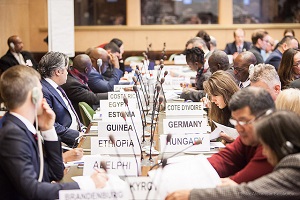
More than 40% of the world population relies on transboundary water resources. Cooperation on these resources is necessary to manage shared waters in an integrated and sustainable way. Such cooperation has the potential to generate many significant benefits for countries involved, such as accelerated economic growth, improved human well-being, enhanced environmental sustainability and increased political stability.
Gaining and sharing experience on the benefits of transboundary water cooperation
In order to explore how to better understand, analyse and communicate the benefits of transboundary water cooperation as well as the cost of inaction, UNECE organized a workshop on 6 and 7 February 2018 bringing together around 90 participants from more than 40 countries. The workshop, held three years after the adoption of the Policy Guidance Note on the Benefits of Transboundary Water Cooperation: Identification, Assessment and Communication, drew together expertise and experience gathered under the Convention on the Protection and Use of Transboundary Watercourses and International Lakes (Water Convention), serviced by UNECE, and by other partners.
Prompting and strengthening transboundary water cooperation by adopting a “benefit lens”
Many challenges can prevent or delay countries from embracing effective joint management of transboundary waters, including an incomplete or biased perception of the possible benefits. Insufficient cooperation in Central Asia, for example, is estimated to cost more than $4.5 billion per year, according to the report Rethinking Water in Central Asia by Adelphi and the Regional Environmental Centre for Central Asia (CAREC).
Experience from several transboundary basins, such as the Zarumilla River Basin shared by Ecuador and Peru, the Torne River Basin shared by Finland and Sweden and the Sio Malaba Malakisi River Basin shared by Kenya and Uganda, highlighted that understanding shared goals but also opposing interests in transboundary basins is key. Jointly identifying the benefits that cooperation can generate indeed helps find plausible pathways and opportunities for significant improvement in cooperation.
Participants of the workshop also recognized that formal agreements serve to anchor cooperation: they ensure predictability, beyond political will. Experience from the Rhine, Sava and Senegal River Basins as well as the North Western Sahara Aquifer System showed that cooperation needs to be continuously built to keep generating benefits for basin countries, illustrating the role of joint bodies as catalyst for water cooperation.
Assessing benefits helps to advance transboundary water cooperation processes
Botswana and Namibia reported that assessing the benefits of transboundary water cooperation in the Cubango-Okavango River Basin after 20 years of cooperation helped take stock of existing tangible benefits that countries may not have been aware of. The assessment, which built on the conceptual framework of the Policy Guidance Note on the Benefits of Transboundary Water Cooperation, has also contributed to understanding the added value of regional projects for the wider development of the basin, beyond unilateral interests.
While it was agreed that quantifying, and to a greater extent giving a monetary value, to the benefits of cooperation is a challenge, evidence on the importance of the benefits of cooperation can support the cooperation policy process. OECD showed for example that the estimated benefits of setting up a joint early warning system in the part of the Kura River Basin shared by Azerbaijan and Georgia outweigh the expected investment costs by more than 15 times. Cooperation in the Senegal River Basin resulted in the fruitful management of joint infrastructures. Future planned infrastructures in the basin should make it possible to save about $450 million annually on basin countries’ oil bills.
Communicating the benefits of cooperation is key to ensuring support to and financing of transboundary water cooperation processes
Proper communication, throughout the cooperation process, and at all levels (from local communities to high-level decision makers) was recognized by participants as a core element to both initiate and sustain cooperation. It can help mobilize financing for development projects in transboundary basins and help gain support and endorsement by local populations where appropriate.
For example, communicating the tangible benefits of cooperation in the Nile Basin in the areas of energy generation and trade, watershed management, ecosystem restoration, food security and water resource management from high-level decision makers to communities plays a crucial role in changing mindsets. Despite diverging positions among Nile Basin countries, particularly between upstream and downstream countries, there has been a growing realization of the benefits of cooperation and the costs it helps to avoid.
In addition, communication between riparians is important even when cooperation is well functioning in order to prompt further progress, address new challenges and inspire innovation.
The benefit approach and the way forward: more support is needed
Participants brainstormed in small groups on their needs and potential contributions to future activities related to the benefits of transboundary water cooperation, confirming that further work on the topic would be valuable. Such proposals and insights will feed in the future programme of work under the Water Convention for the period 2019–2021, to be adopted by the Meeting of the Parties at its eighth session in October 2018.
More information on the workshop and presentations are available at: http://www.unece.org/index.php?id=46345